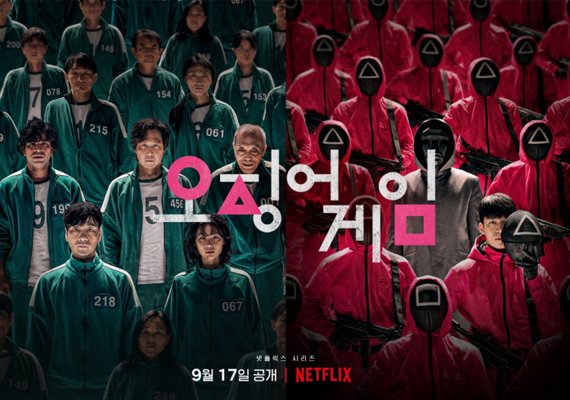Popularity of Squid Games Shows Trend in Korean Film Industry

November 18, 2021
With the South Korean film industry’s sudden rise in popularity, certain themes and arguments seem to reappear from film to film.
Recently, Parasite, Squid Game, and Train to Busan have become popular at an accelerated rate, and their popularity has brought attention to certain political issues and discussions that are prevalent in Korean society. With parallel themes stretching across various films and shows, the similarities seem too common to be left up to coincidence.
The Cinema of South Korea is the name given to the Korean film industry starting from 1945 to present day. Like all non-American film industries, it is overshadowed in size and wealth by Hollywood. But the recent increase in Korean culture’s global popularity has paved the way for the Cinema of South Korea to be thrown into the limelight. Films like Parasite, and Train to Busan have become incredibly popular worldwide, both winning multiple awards in doing so. The recently released Squid Game has already broken Netflix’s view count record, bringing in 111 million viewers within the first six weeks of its release.
“I loved the visual representation of the themes,” said Christy Boas, a civics teacher at Skyline High School, regarding her thoughts on Parasite. “…themes of class systems and how capitalism is something that everyone dreams of but it’s so hard to make it in a capitalist society…”
These themes are heavily influenced by the political and social sphere in Korean society, with poverty, class issues, and anti-capitalism being common parallels between all three films.
“If you’re rich, then honestly everything’s just set up for you.” said John Oh, a South Korean student who moved to the U.S last year. “If you’re poor there’s almost zero-percent chance that you’ll get to the top or the middle… in Korea, there’s a line.”
The massive class divisions in South Korea have been a constant issue in the countries development; Koreans even have a specific expression for arrogance and snobbery when referencing those in power; 갑질 or Gapjil in English.
“…I think the people are desperate,” said John. “Everyone around me basically didn’t have poverty…when you don’t have it you just don’t care about it.”
This neglectful attitude towards poverty is clearly portrayed in Parasite and Squid Game, with both the movie and the show displaying the perspectives of the needy and expressing their reactions to their neglect.
Although Korean culture is massively impacting the western world, little is known by the average consumer about their society on a day by bay basis. By remaining ignorant to the messages and narratives in South Korean media, we disrespect their culture and refuse to educate ourselves as a society.











